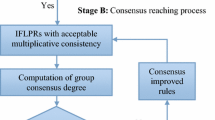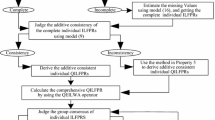Abstract
This paper proposes a goal programming approach to solve the group decision-making problem where the preference information about alternatives provided by decision makers can be represented in three formats, i.e., incomplete multiplicative preference relations, incomplete fuzzy preference relations and incomplete linguistic preference relations. In the approach, a transformation function is introduced to transform the incomplete linguistic preference relation into an incomplete fuzzy preference relation. To narrow the gap between the collective opinion and each decision maker’s opinion, a liner goal programming model is constructed to integrate the three different formats of incomplete preference relations and to compute the collective ranking values of the alternatives. Thus, the ranking order of alternatives or selection of the most desirable alternative(s) is obtained directly according to the computed collective ranking values. A numerical example is also used to illustrate the feasibility and the applicability of the proposed approach.

Similar content being viewed by others
References
Alonso S, Cabrerizo FJ, Chiclana F, Herrera F, Herrera-Viedma E (2009) Group decision-making with incomplete fuzzy linguistic preference relations. Int J Intell Syst 24:201–222
Buyukozkan G, Feyzioglu O, Ruan D (2007) Fuzzy group decision-making to multiple preference formats in quality function deployment. Comput Ind 58:392–402
Carmone FJJ, Kara A, Zanakis SH (1997) A Monte Carlo investigation of incomplete pairwise comparison matrices in AHP. Eur J Oper Res 102:538–553
Chiclana F, Herrera F, Herrera-Viedma E (1998) Integrating three representation models in fuzzy multiperson decision-making based on fuzzy preference relations. Fuzzy Sets Syst 97:33–48
Chiclana F, Herrera-Viedma E, Herrera F, Alonso S (2007) Some induced ordered weighted averaging operators and their use for solving group decision-making problems based on fuzzy preference relations. Eur J Oper Res 182:383–399
Delgado M, Herrera F, Herrera-Viedma E, Martinez L (1998) Combining numerical and linguistic information in group decision-making. Inform Sci 107:177–194
Fan ZP, Xiao SH, Hu GF (2004) An optimization method for integrating two kinds of preference information in group decision-making. Comput Ind Eng 46:329–335
Fan ZP, Ma J, Jiang YP, Sun YH, Ma L (2006) A goal programming approach to group decision-making based on multiplicative preference relations and fuzzy preference relations. Eur J Oper Res 174:311–321
Gong ZW (2008) Least square method to priority of the fuzzy preference relations with incomplete information. Int J Approx Reason 47:258–264
Herrera F, Herrera-Viedma E (2000) Linguistic decision analysis: steps for solving decision problems under linguistic information. Fuzzy Sets Syst 115:67–82
Herrera F, Martinez L (2001) A model based on linguistic 2-tuples for dealing with multigranular hierarchical linguistic contexts in multi-expert decision-making. IEEE Trans Syst Man Cybern B: Cybern 31:227–234
Herrera F, Herrera-Viedma E, Verdegay JL (1996a) Direct approach processes in group decision-making using linguistic OWA operators. Fuzzy Sets Syst 79:175–190
Herrera F, Herrera-Viedma E, Verdegay JL (1996b) A model of consensus in group decision-making under linguistic assessments. Fuzzy Sets Syst 78:73–87
Herrera F, Herrera-Viedma E, Chiclana F (2001) Multiperson decision-making based on multiplicative preference relations. Eur J Oper Res 129:372–385
Herrera F, Martinez L, Sanchez PJ (2005) Managing non-homogeneous information in group decision-making. Eur J Oper Res 166:115–132
Herrera-Viedma E, Herrera F, Chiclana F, Luque M (2004) Some issues on consistency of fuzzy preference relation. Eur J Oper Res 154:98–109
Herrera-Viedma E, Chiclana F, Herrera F, Alonso S (2007) Group decision-making model with incomplete fuzzy preference relations based on additive consistency. IEEE Trans Syst Man Cybern B: Cybern 37:176–189
Hwang CL, Lin MJ (1987) Group decision-making under multiple criteria: methods and applications. Springer, Berlin
Ignizio JP (1976) Goal programming and extensions. Lexington, DC, Health, MA
Jiang YL (2007) An approach to group decision-making based on interval fuzzy preference relations. J Syst Sci Syst Eng 16:113–120
Kim SH, Choi SH, Kim JK (1999) An interactive procedure for multiple attribute group decision-making with incomplete information: range-based approach. Eur J Oper Res 118:139–152
Ma J, Fan ZP, Jiang YP, Mao JY (2006a) An optimization approach to multiperson decision-making based on different formats of preference information. IEEE Trans Syst Man Cybern A: Syst Hum 36:876–889
Ma J, Fan ZP, Jiang YP, Mao JY, Ma L (2006b) A method for repairing the inconsistency of fuzzy preference relations. Fuzzy Sets Syst 157:20–33
Saaty TL (1980) The analytic hierarchy process. McGraw-Hill, New York
Tanino T (1984) Fuzzy preference orderings in group decision-making. Fuzzy Sets Syst 12:117–131
Wang YM, Fan ZP (2007) Group decision analysis based on fuzzy preference relations: logarithmic and geometric least squares methods. Appl Math Comput 194:108–119
Wang YM, Fan ZP, Hua ZS (2007) A chi-square method for obtaining a priority vector from multiplicative and fuzzy preference relations. Eur J Oper Res 182:356–366
Xu ZS (2004) Goal programming models for obtaining the priority vector of incomplete fuzzy preference relation. Int J Approx Reason 36:261–270
Xu ZS (2005) Deviation measures of linguistic preference relations in group decision-making. Omega 33:249–254
Xu ZS (2006) Incomplete linguistic preference relations and their fusion. Inform Fusion 7:331–337
Xu ZS, Chen J (2008) Group decision-making procedure based on incomplete reciprocal relations. Soft Comput 12:515–521
Zhang Q, Ma J, Fan ZP (2001) Evaluation and selection of R&D projects in government funding agencies. Working Paper, Department of Information Systems, City University of Hong Kong, Hong Kong
Acknowledgments
This research was partly supported by the National Science Funds for Distinguished Young Scientists of China (Project No. 70525002), the National Science Funds for Creative Research Groups of China (Project No. 70721001), National Science Foundation of China (NSFC, Project Nos. 70701008 and 90924016) and National Postdoctoral Foundation of China (Special Funding) (Project No. 200801394). The authors also wish to thank the editor and the anonymous reviewers for their helpful comments and suggestions on an earlier version of this manuscript.
Author information
Authors and Affiliations
Corresponding author
Rights and permissions
About this article
Cite this article
Fan, ZP., Zhang, Y. A goal programming approach to group decision-making with three formats of incomplete preference relations. Soft Comput 14, 1083–1090 (2010). https://doi.org/10.1007/s00500-009-0503-4
Published:
Issue Date:
DOI: https://doi.org/10.1007/s00500-009-0503-4




